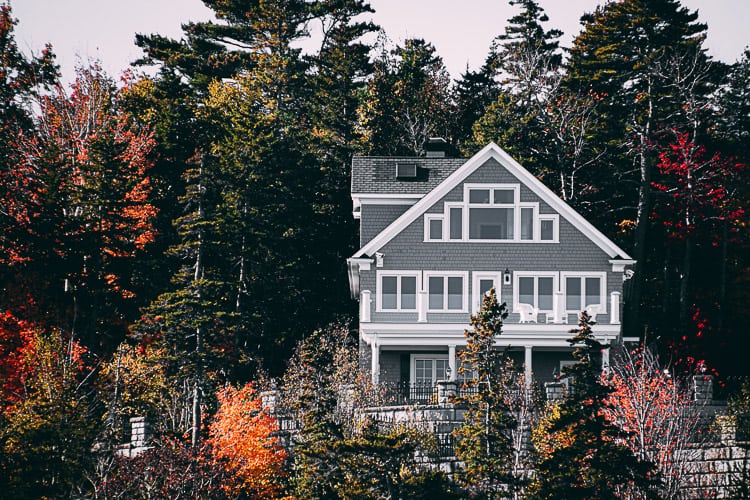Retiring in Canada is a popular option for many retirees. And, it is not just people looking to retire to Canada from the USA. This vast country has a range of options for you to choose from. This article explores look at why Canada is such a popular destination for retirees, and the best way to retire to Canada.

Why Retire in Canada?
Life in Canada is safe and straightforward without any substantial hardships. It is one of the safest countries on earth. And, Canada consistently ranks as one of the best countries to live in.
Canada cares about human rights and is committed to social justice. It is a beautiful country that embraces cultural diversity and is warm and welcoming towards immigrants. To know more about what living in Canada is like, see our detailed guide!
How to Retire in Canada?
Canada has no official retirement visa. As such, it can be tricky to move to Canada as an elderly retired person from abroad. You’ll need to find a visa or residency program that suits your situation.
You have two main options if you don’t intend to work in Canada.
1) Canada Investor Visa
2) Family Class Sponsorship
If you plan to work in Canada, then one of Canada’s work visas or skilled migration programs may be more suitable.
We advise a consultation with a Canada Immigration expert to find your best immigration opportunity to retire in Canada.
Visitor’s Visa
The easiest way to enter Canada is with a visitor’s visa (non-permanent resident visa). Generally, it allows you to stay up to six months.
While you apply for a visitor’s visa, you are automatically considered for a multiple entry visa. A multiple-entry-visitor’s-visa remains valid for ten years (unless your passport expires). During these ten years, you can stay in Canada for six months at a time, as many times as you want.
Visitor Record
A Visitor Record is a document issued by border control that changes how long you can stay in the country. It may mean you can stay for longer than the usual six months. It may also mean that your stay is limited, and you have to exit the country by a specific date.
If you want to extend your stay in Canada, you can apply for a Visitor Record. You must do it 30 days before your current status expires. Although it allows you to stay for longer in Canada, it does not guarantee that you can re-enter the country. That decision depends on border control.
Visa-Free Visits
If you are from a visa exempted country, you won’t need a visa to enter the country. An Electronic Travel Authorization (eTA) is required to enter the country while traveling by air. Citizens of the US, UK, Australia, New Zealand, and most EU countries do not need a visa to enter Canada. Check here to find out if you are eligible for visa-free entry.
Super Visa for retiring in Canada
Super visas are designed to reunite families. Parents and grandparents of Canadian citizens or permanent residents can apply for a Super Visa. It is a multiple-entry visa that allows you to stay in Canada for up to two years at a time. This is a multiple-entry visa valid for ten years.
To obtain this visa, you need to get a letter signed by your child or grandchild inviting you to Canada. In this letter, they must promise to take care of you financially during your stay in Canada, showing documented proof. The letter should also mention how many members are in their household. You’ll also need to submit a copy of your child’s (or grandchild’s) citizenship or permanent resident document.
To be eligible for a Super Visa, you also need to obtain medical insurance from a Canadian insurance company. It should have a coverage of at least $100,000 with a validity of at least one year.
Parents and Grandparents Sponsorship Programs
This is probably your best pathway to getting permanent residency in Canada as a retiree. The process is not easy. Canada opens its Parents and Grandparents Program once a year. Canadian citizens and permanent residents can then submit an Interest to Sponsor form. After the submission is closed, the officials of the Canadian immigration department review the applications and select applicants at random. Then the potential sponsors are invited to apply for the next round.
Applicants have to prove that they have enough income to financially support themselves for twenty years. Their spouse or common-law partner can co-sign to combine their income. Your sponsor also has to repay any provincial social assistance that you get during this period.
If your child or grandchild lives in Quebec, the rules are slightly different. Quebec runs its own immigration sponsorship program and sets its regulations independently. Visit their website to find out more about Quebec’s immigration program.
Pension and Old Age Benefits when retiring in Canada
Canada’s retirement benefits comprise three elements: Canada Pension Plan (or Quebec Pension Plan), Old Age Security, and employer-sponsored pension plans. To get these benefits, you must be a Canadian citizen or legal resident of Canada.
Expats who retire in Canada will not get any of these benefits. They need income from pension schemes or investments. Many countries allow you to move your pension overseas. You can receive your pension benefits in your Canadian bank account or your bank in your home country.
Retirees and Taxation
If you are thinking of retiring to Canada, you will need to work out where to file tax returns. Your tax obligation in Canada will be determined by your residency status, which may not be the same as your immigration status. Canada determines an individual’s residency status on a case-by-case basis considering their whole situation and other relevant facts.
While determining your residency status for income tax purposes, first consider whether you maintain any residential ties with Canada. A home in Canada, a spouse or common-law partner who lives in Canada, or dependents in Canada are considered significant residential ties. The secondary residential ties include:
- Personal property in Canada (such as a car or furniture).
- Membership of Canadian organizations, including recreational or religious organizations.
- Canadian bank account or credit card, driver’s license.
- Canadian passport.
Besides your residential status, several other factors are taken into account to determine your tax obligations. These include the length of time, intent, object, or continuity while inside and outside Canada.
Bear in mind that you can purchase properties and open bank accounts in Canada with a temporary resident visa. However, owning a house in Canada as a non-permanent resident could make you liable to pay taxes in Canada. Read the guide on Canada Revenue Agency’s website to find out more.

Health Care when retiring in Canada
Healthcare is a primary concern for most retirees. Canada is known for its excellent medical care facilities. The country has a universal free health care system, but this is not available to temporary residents.
When retiring to Canada, you will need to obtain private health insurance to cover your medical expenses (unless you have permanent residence or citizenship). Depending on your plan and status, a global medical insurance plan may suit you best.
Retiring to Canada from the USA
Canada’s Temporary Visa requires you to leave the country every six months, which can be cumbersome. If you are from the USA, however, you have certain advantages.
The geographical proximity makes it easier to travel back and forth between these two countries. American citizens do not need to obtain a visa or an eTA to travel to Canada. You can simply show up at the border with a valid American passport.
This flexibility means that many US citizens choose to spend part of the year in the Great White North. You can enjoy all the benefits Canada has to offer while returning home when you want.
As an American citizen, you will continue to get Social Security benefits after retiring to Canada. You will need an international health insurance plan that covers your medical costs in both countries. US health insurance is unlikely to cover any claims if you are retiring in Canada.
Before you decide to move to Canada, you should understand tax arrangements. Even if you are not a permanent resident for immigration purposes, you may still have to pay taxes in Canada. You will have to file a tax return in both countries, but you won’t be double-taxed. You can take advantage of the US-Canada tax treaty to optimize your tax return. This treaty may also enable you to recover some tax that you pay on your Social Security benefits.
How much money do you need to retire in Canada?
Like anywhere, discussions of cost-of-living in Canada are complicated. And, how much money you need to retire in Canada will depend on your lifestyle. However, here are some general guidelines for budgeting when retiring in Canada.
Expats living in Canada report that groceries, clothing, transport, and entertainment costs are similar to the equivalent in the USA.
Importantly, some big-ticket items for retirees in Canada are much cheaper than in the USA. Healthcare, housing, personal care, and utilities are cheaper in Canada than in the USA. This means that for most retirees you’ll have a much higher quality of life in Canada than in the USA.
Remember, the cost of living in Canada varies greatly between states and between big cities and the countryside. Finding the right place to suit your budget is a great place to start.
Many good Canadian financial advice websites have retirement savings calculators. Here’s one from Scotia Bank, which you can use to budget for retiring in Canada.
Best places in Canada for Retirees
As an Expat retiree, you’ll need to consider many aspects while deciding where to live. Here’s an oversight of the most popular places for retirees.
Remember, you don’t have to be a Canadian citizen or resident to buy property in Canada. Foreign citizens and residents can buy homes or investment property in Canada.
Toronto, Ontario
Toronto is great for active and healthy retirees who wish to enjoy life in the hustle and bustle of a big city. It is one of the most diverse cities in the world, and you’ll get a truly multicultural experience.
Almost half of the population in Toronto has come from outside Canada. The population speaks more than 140 languages and dialects. In this city, you get all the amenities at your fingertips. However, the price of real estate is very high if you choose Toronto for retiring in Canada.
London, Ontario
London is the tenth-largest city in Canada. If you want to enjoy all the facilities of city life while not feeling overwhelmed, London is your city. It is a hub of excellent regional healthcare. The weather is humid, and during the winter, it gets heavy snowfall.
London is particularly popular with American Expats retiring in Canada due to its close proximity to Detroit. It takes around two hours to reach Detroit from London by car. Consider living in London if you have to return to the US regularly.

Vancouver, British Columbia
Vancouver is the third-largest city in Canada in terms of population. This cosmopolitan city is surrounded by sea and mountains. Rents are high here compared to other cities, but it is renowned for its healthy lifestyle.
It is one of the driest cities in Canada during the summer months, but the temperature is never unbearably hot. From late fall, it starts raining in Vancouver and continues through the winter. This winter rain can be frustrating for many, especially if you are not accustomed to it.
Vancouver is one of the most laid-back cities, and marijuana is widely accepted in local culture. Vancouver also has a large gay community and hosts one of the largest pride parades in Canada.
Halifax, Nova Scotia
Halifax is a bit out of the way, but it offers the opportunity to live near the water at a reasonable price. It is a cosmopolitan city in a naturally beautiful setting. Halifax, and the nearby cities of Dartmouth and Bedford, have a mild climate and offer good support for seniors. Like much of Canada, it welcomes newcomers.
Calgary, Alberta
Calgary is one of the cleanest cities in Canada. It is wealthy and populous. The best thing about Calgary is its low cost of living and affordable real estate. In this province, you do not need to pay a provincial sales tax, general capital tax, or municipal sales tax. The income tax in Calgary is also the lowest in the country, which makes it a popular choice for retiring to Canada.
Summer in Calgary is warm and dry, and nights are cool and comfortable. Winter months get a fair share of snow, but the temperature rises quickly due to dry Chinook winds.
The city is proud of its cowboy tradition and is known as the ‘Texas of Canada.’ If you are looking for an affordable place to retire from where you can enjoy all the facilities of urban life, consider Calgary.
Fredericton, New Brunswick
Fredericton is located along the banks of the St John River. The city is one of the most affordable destinations in Canada. The city has a rich cultural heritage and a thriving art scene. While in Fredericton, you can enjoy music and art events all through the year. The city has a semi-continental climate and gets plenty of suns whilst still having snow for around three months each year.
Retiring in Canada: What Next?
Retiring in Canada can be rewarding if you have the means to cover your needs. Visa requirements and taxation can be a little overwhelming, so you’ll need to have a clear plan before taking the next big step. A highly efficient immigration lawyer can help you through the process of retiring in Canada.









Thank you for this information. The thought of retiring in Canada has become increasingly more appealing over the past decade.